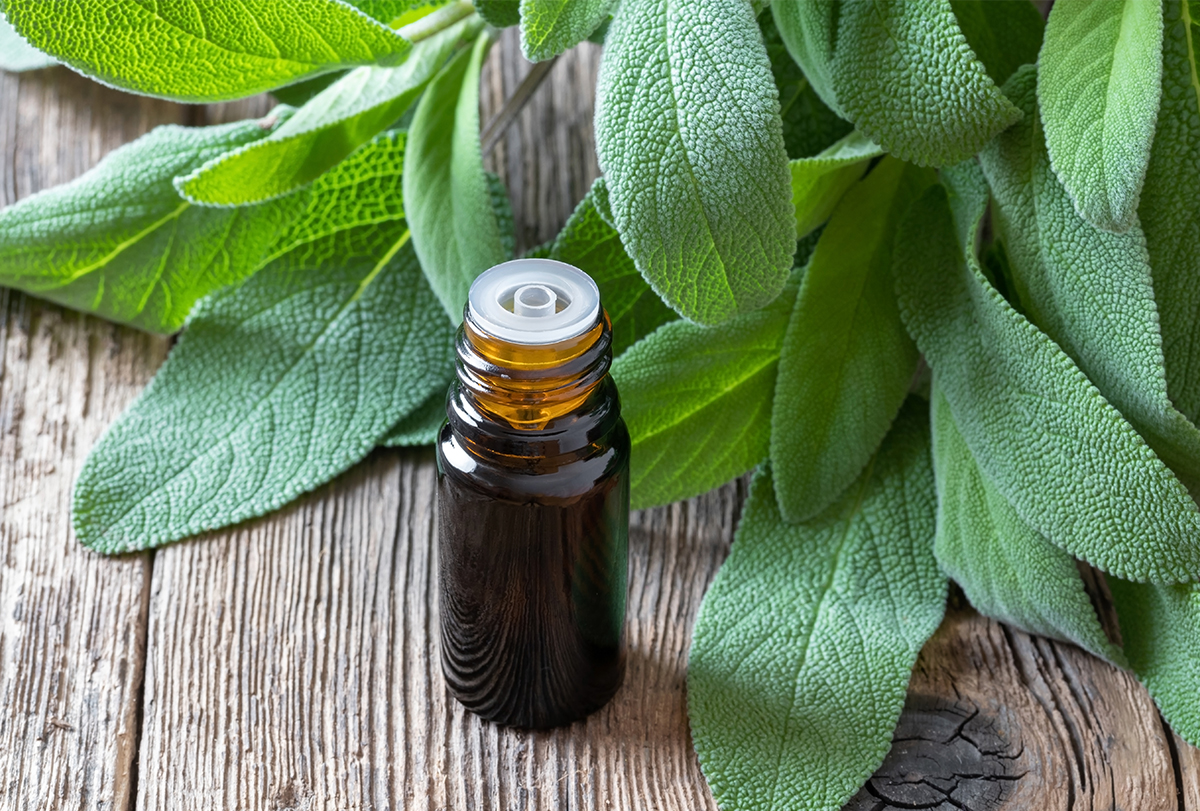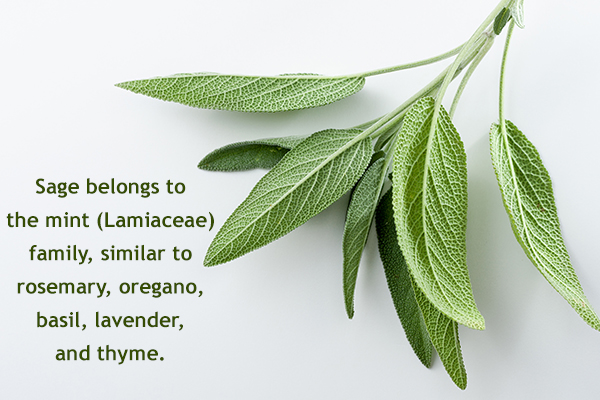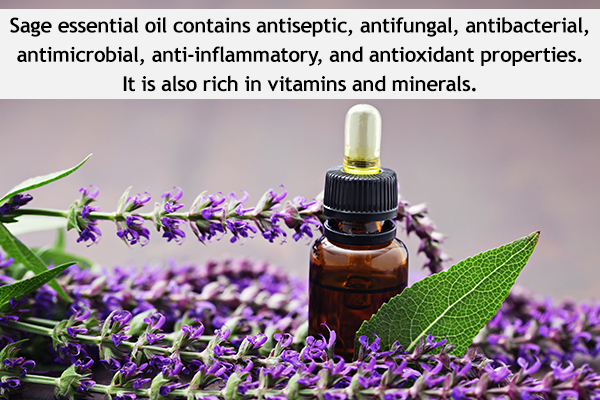In this article:
Sage is a popular medicinal herb that has been used for a long time for the treatment of various medical conditions and promotion of overall health in general. (1)

Sage extracts, which can be found as a chief active ingredient in many organic products, are especially useful in improving the overall health of hair, making it shiny and strong.
Moreover, sage imparts a soothing aroma, contributing to its increased use in creams and lotions for hair and skin care. It has also been used by the Romans to help improve digestion and treat sore throats, wounds, and ulcers.
What Is Sage?

Sage is a perennial, evergreen herb with a lot of varieties. It is scientifically called Salvia, from the Latin word “salvere,” which translates to “to be saved.” This herb belongs to the mint (Lamiaceae) family, (2)(3) similar to rosemary, oregano, basil, lavender, and thyme.
Sage is native to Southeastern Europe and the Mediterranean. The most common culinary variety is Salvia officinalis, more commonly known as kitchen, garden, or common sage.
The plant has woody stems and dusty greyish-green oval leaves with velveteen, small, hair-like projections. These structures give sage a fuzzy appearance and a cottony texture, making it difficult to eat the leaves raw.
Varieties of Sage
Numerous varieties of sage are available, but some varieties are more popular for their medicinal and culinary uses and are thus commonly grown, including:
- Clary sage: The leaves of clary sage have a strong aroma and are generally used in perfumes and throat gargle infusions. (4)
- Azure sage: Native to Mexico, this variety of sage has blue flowers and is often used as a herbal elixir.
- Three-lobed sage: As the name signifies, the three-lobed sage, has lobed leaves and is a large, perennial shrub. It is commonly found in Mediterranean countries and is harvested for sage tea.
- Pineapple sage: This variety of sage is commonly employed for its medicinal benefits. It is used as an ingredient in decoctions and infusions for the improvement of oral, digestive, blood pressure, insomnia, anxiety, and central nervous system problems. (5)
Benefits of Sage to Hair

Sage and its extracts pose various benefits to hair health, including the following:
1. Prevents hair loss
Since ancient times, sage has been highly popular for making the hair strong and preventing hair loss. This herb contains high amounts of beta-sitosterol, a 5-alpha reductase compound, (6) which is highly efficacious in the treatment of male-pattern baldness.
How to use:
- Mix 3–4 drops of sage essential oil with a few drops of peppermint or rosemary essential oil. Dilute this mixture with 1 tbsp of olive oil, and massage the oil blend onto the scalp twice a day.
- Use sage tea as a hair rinse.
2. Restores shine to hair
The use of sage tea can impart a healthy glow to the hair, making it appear shiny. Sage tea can also help control and treat dandruff.
How to use:
- Add 1 tsp of dried sage leaves to a cup of water and bring to a boil.
- Allow to steep for 2–3 minutes and filter.
- Cool and use it to rinse your hair.
3. Stimulates hair growth
Sage not only helps prevent hair loss, but it also rejuvenates and strengthens the hair follicles. The use of sage can also boost blood circulation in the scalp, increasing the supply of nutrients to the hair follicles.
Therefore, regular use of sage can help revitalize the hair, helping manage the problem of hair thinning. It also helps unclog the hair follicles.
How to use:
- Prepare a sage-rosemary rinse by adding the herbs to boiling water.
- Use the rinse one to two times a week to help thicken the hair.
4. Darkens hair
Sage leaves contain pigments that can darken gray hair naturally. Sage tea contains tannins that can act as hair dye.
How to use:
- Add 3–4 sprigs of fresh sage or 1 tsp of dried sage leaves to 2 cups of water and bring to a boil.
- Lower the heat, and let the tea simmer for around 5 minutes.
- Allow the tea to cool for 2 hours and strain.
- Use the strained liquid to rinse your hair.
5. Acts as a lotion
The use of sage can help improve hair texture, making it soft and manageable. A setting lotion prepared using sage can penetrate the hair and work from the inside.
How to use:
- Add equal parts of sage leaves and rosemary to a cup of water. Boil the mixture and simmer for 3 minutes. Allow the tea to steep for 3 hours. Massage the tea onto your hair before styling it.
- Use of conditioners that contain sage and coconut to nourish the hair and improve the hair quality.
Sage Oil for Hair

As discussed, sage essential oil can help in the prevention of hair loss. This essential oil, which is extracted through steam distillation of sage leaves, poses many other benefits to the hair and scalp as well. (7)
Sage essential oil contains antiseptic, antifungal, antibacterial, antimicrobial, anti-inflammatory, and antioxidant properties. It is also rich in vitamins and minerals, including vitamins A, B, and C, potassium, and calcium.
Sage oil can easily penetrate the scalp and deliver these nutrients that are vital for the development and growth of hair strands directly to the hair follicles. This enables the growth of multiple hair strands from a single follicle, making the hair stronger and thicker. (8)
Moreover, sage oil can help clear scalp buildup, bacteria, and free radicals from the head. It also moisturizes the hair, cleanses excess scalp oil, and rebalances the scalp pH. However, these benefits of sage oil depend on the stage of the hair growth cycle, namely, the growth, transition, or resting phase.
Therefore, it is essential to understand how sage oil works and utilize it correctly. Proper use of sage oil not only improves hair health but also avoids exposure to the chemicals found in commercial hair care products.
Final Word
Sage is a popular herb that is often used as a spice in different cuisines. It also has numerous medicinal properties and is readily available in the form of liquids, lozenges, tablets, tinctures, and capsules.
You can also enjoy the health benefits of sage by consuming it in the form of tea. It is most potent in its oil form, which can help manage hair loss, boost circulation to the scalp, provide nutrition, clear dandruff, and impart a shine to the hair. It is best to consult a doctor on the appropriate usage and dosage of sage according to your needs.
- Was this article helpful?
- YES, THANKS!NOT REALLY


